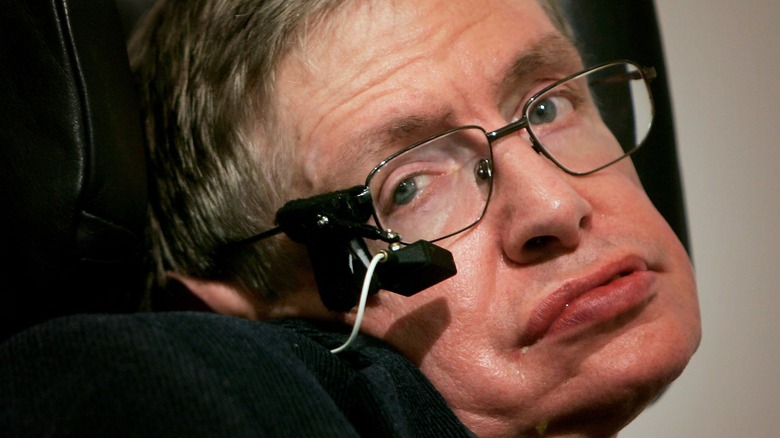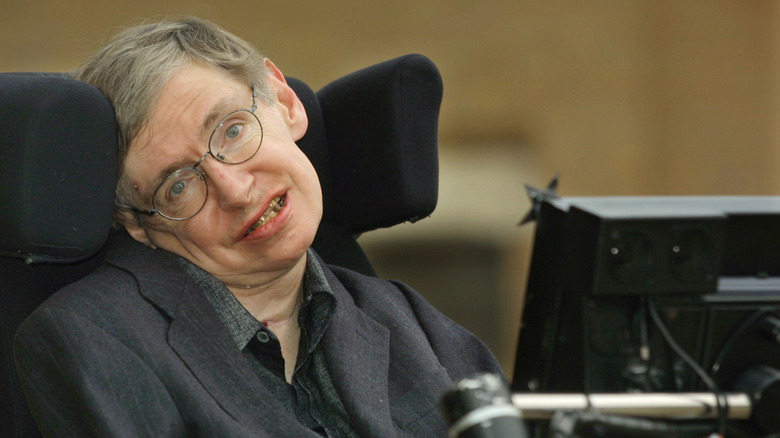How Stephen Hawking's Death Was One Big Coincidence
Over the course of our lives, tragically, we'll see many of the greats die. All the fame, fortune, and general renown in the world doesn't buy immortality, and each beloved athlete, musician, artist, director, writer, acting talent, and other giant of their respective field will eventually pass away.
Whatever they were famous for, an icon is an icon, and truly and forever one of a kind. According to Graceland's official website, when Elvis Presley died in 1977, President Carter himself said, "Elvis Presley's death deprives our country of a part of itself. He was unique, irreplaceable. ... His music and his personality ... permanently changed the face of American popular culture."
British scientific legend Stephen Hawking, of course, is a character worlds apart from the wildly-gyrating, audience-inflaming, "Hound Dog"-crooning King. In his own field and his own career, though, Hawking was a superstar of equal significance, and his death was lamented around the world. It was also strangely coincidental, for various intriguing scientific reasons.
The great coincidences of the date of Stephen Hawking's death
Stephen Hawking, Britannica reports, was 76 years old when he died on March 14th of 2018. Though his amyotrophic lateral sclerosis had been taking an increasing toll on his body for almost 60 years by the time of his death, the great man's passion for science and discovery never wavered.
Days after Hawking's death, BBC News published the very last broadcast interview with him. The eminent physicist said that the discovery of a neutron star collision producing gravitation waves indicated, "surprises that cannot yet be foreseen. We are still rubbing our eyes, or rather ears, as we have just woken up to the sound of gravitational waves." Clearly, his sense of wonderment in his craft, and his passion for it, was as strong as ever, right to the end.
Hawking also tempered his scientific exploits with his love of a good joke. In a 2014 appearance on "Last Week Tonight With John Oliver" (via LastWeekTonight on YouTube), the host asked whether there could theoretically be a parallel universe where he is more intelligent than Hawking. The scientist told Oliver in response, "Yes. And also a universe where you're funny."
The force was equally strong with Hawking's scientific and silly sides, so he would surely appreciate the scientifically significant yet amusingly tragic irony of the day of his death. Per History, he died on Albert Einstein's birthday, March 14, and that's just the start of the remarkable coincidences.
Stephen Hawking, Pi, Galileo Galilei and Albert Einstein
What else would be important about March 14 to a brilliant mind like Stephen Hawking? Well, March 14 is also Pi Day. According to the official website for this mathematical celebration, Pi Day honors the fact that 3.14 (ie March 14) is the value we assign to Pi, the number of times a circle's diameter will go into its circumference. Pi's true value stretches on forever (more than 50 trillion digits of it have reportedly been calculated), but 3.14 is more than precise enough for most. Hawking would have likely appreciated the fact that he died on such an intellectually important day, and could surely have rattled off many of the digits of Pi himself if he'd cared to.
There's even more to the tale, too. As Warren Leight stated on Twitter on the day of Hawking's death, "Stephen Hawking was born January 8, 1942, on the 300th anniversary of Galileo's death. He died today, March 14th, on the anniversary of Einstein's birth. Time is circular — no beginning, no end."
Per Britannica, Galileo Galilei did indeed die on January 8, 1642. How fascinating to think that cosmic coincidences link Hawking, Einstein and Galileo, three of the finest and most innovative minds humanity has ever known. Even better still, you just know that nobody would appreciate this more than the trio themselves.


